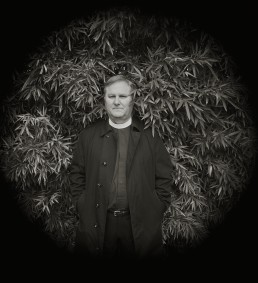S3: Fine Line - Episode 6 - Michael

Episode Information
Fine Line: Mental Health/Mental Illness – Episode 6 – Michael
[Intro Music]
Narrator: Welcome to Season three Fine Line narrative histories about mental health and mental illness, a traveling exhibition and weekly podcast edited and hosted by Michael Nye, supported by Kronkosky Charitable Foundation. May you find insight and understanding in these voices. Episode six, Michael.
Michael: Well, my name is Michael and I am 53 years old. I am a licensed marriage and family therapist. I am an ordained United Methodist minister. I’m also the chair of the board for the Mental Health Association. My occupation is that I am a hospital chaplain by trade, and that I oversee and resource the pastoral care services, uh, of Methodist healthcare. I think the qualities for chaplaincy are first of all to have what we in the business call a chaplain’s heart. And what that means is that one has a tremendous amount of care and compassion for other humans. I think one must be very comfortable and yet uncomfortable in their own theology. If that’s not too much of a paradox, very open to other people’s, uh, beliefs. I think that a chaplain has to know that they cannot walk into the wrong room, uh, and to be a non-anxious presence in the midst of crisis and chaos.
<laugh>, my mother probably said it best when she said I was a little banny rooster. And, uh, I was quite independent, very bossy, quick to, uh, figuratively or literally fight. But I think also I would be described, uh, as someone who, who really enjoyed life. It’s a negative way to express it, but, but I was too much for a lot of people. You know, I was too spontaneous. I was too loud. I was too, uh, full of life. And, uh, most of my childhood was being told to tone that down. What is it to be human. To me is to have a soul. Uh, we have in common a desire to love and be loved. We have in common a desire to be a part of that which is greater than ourselves to experience, uh, meaning in life. How does one live as opposed to survive?
Another thing that we have in common is some sort of an acceptable definition of what is mental health and what to do with those that fall outside those parameters. <laugh>, I I think that we, we need to be asking ourselves, how can we help make life better, uh, for people who suffer with, with chronic mental illness? I think some of the more common stereotypes, uh, is found in the verbiage or the vocabulary that we use. Uh, one who first of all is dangerous. Uh, one who cannot be trusted. Um, a person with chronic mental illness is, is stupid or dumb. They are people who don’t have the moral fiber or the character to overcome their, their disease. Uh, and in a, in a very real way, we ghetto wise, mentally ill by, uh, putting them out on the street and making them homeless. Uh, it is morally obscene that we would spend $3 billion on the election of a president and have homelessness in our country.
Yes, I think I was in denial for a long time. I was in avoidance. I I simply didn’t know what the symptoms were. I didn’t realize that rage was a symptom of clinical depression. And I did not realize that the horrendous mood swings that I experienced in my life were a part of depression. And I also noticed, you know, that for no real apparent reason, I would be thinking about suicide. I’d be thinking, you know, the world will be better off without me. Uh, and a lot of real belittling self-talk now to be on medication and to not put myself into that experience is just tremendously liberating. And to not have to be afraid that if I try to strike a match and the match breaks instead of ignites, that I don’t have to go into a, something that traumatizes my family. Life is very, very short. And it can be changed and altered in an instant. And to recognize that, I consider that a blessing to be exposed to that constant reminder. I be attuned to my family, that I be attuned to my colleagues, that I be attuned to my friends because I have absolutely no promise of anything happening tomorrow.
[Outro Music]
Host: Mental illness is so deep and wide and mysterious. It’s painful. It impacts thinking, mood and behavior. It’s about a longing to feel better. In the years I worked on Fine Line Mental. Health, Mental Illness, 50% of the individuals I met with said that their healthcare provider, doctor, psychologist, did not listen to them, did not remember what they said, did not understand their illness are what they experienced. However, the other 50% of those I met with said the opposite. That their doctor, therapist, psychiatrist, was critically important to them, did listen carefully and remember often responsible for their improvement and sometimes even saving their lives. Is having someone to listen, really listen, a friend, a family member, a doctor, is it an integral part of healing and understanding? Thank you, Michael, for your wisdom, your openness, and your presence. I’m Michael Nye. You can go to my website, michaelnye.org/podcast for Michael’s portrait and transcript. Thank you for listening.
